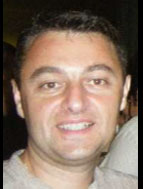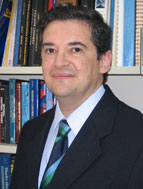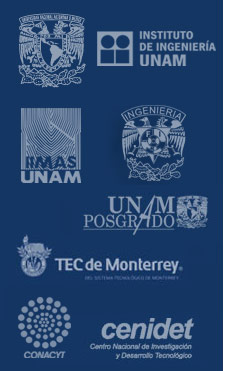Pre-Symposium Courses![]()
Pre-conference courses will be held on Monday and Tuesday August 27-28 2012. At 9 to 6 pm.
To deposit directly the registration fee
- Use the account owner: ASOCIACIÓN DE MÉXICO DE CONTROL AUTOMÁTICO, AC
BANK: BBVA BANCOMER, SUC. 0111.
ADDRESS: AV. UNIVERSIDAD 1200, 03339, MEXICO, DF, MEXICO.
AMCA Account: 0172834464
CLABE: 012180001728344641
ABA: 012000021
SWIFT: BCMRMXMMPYM - Fill the subscription form at Registration Pre Symposium
 |
S Joe Qin Monday August 27, 2012, |
|
Data-driven process monitoring (DPM) methods apply multivariate statistics and machine learning methods to fault detection and diagnosis, which has become one of the most fruitful areas in both research and applications over the last two decades. Using methods from multivariate statistical analysis, DPM has found wide applications in different industrial processes, including chemicals, polymers, microelectronics manufacturing, iron and steel, and pharmaceutical processes. The tasks involved in DPM typically include: (i) fault detection; (ii) fault identification, classification, or diagnosis; and (iii) fault reconstruction that estimates the fault-free values to keep control and monitoring on-going even if some faults have occurred. Due to the data-based nature of the DPM methods, it is relatively easy to apply to real processes of rather large scale comparing to other methods based on systems theory or rigorous process models. Biography S Joe Qin is the Fluor Professor of Process Engineering and Vice Dean at the Viterbi School of Engineering at the University of Southern California. He obtained his B.S. and M.S. degrees in automatic control from Tsinghua University in 1984 and 1987, respectively, and the Ph.D. degree in chemical engineering from the University ofMaryland at College Park in 1992. His research interests include statistical process monitoring, fault diagnosis, model predictive control, system identification, run-to-run control, and control performance monitoring. He is a codirector of the Texas-Wisconsin-California Control Consortium. He is a recipient of the National Science Foundation CAREERAward, the 2011 Northrop Grumman Best Teaching award at Viterbi School of Engineering, the DuPont Young Professor Award, Halliburton/Brown & Root Young Faculty Excellence Award, and an IFAC Best Paper Prize for a paper published in Control Engineering Practice, and is an IEEE Fellow. He is currently an associate editor for the Journal of Process Control and IEEE Transactions on Industrial Informatics, and a member of the Editorial Board for the Journal of Chemometrics. He served as an editor for Control Engineering Practice and an associate editor for IEEE Transactions on Control Systems Technology.
|
|
 |
David Henry & Efraín Alcorta Tuesday August 28, 2012, |
 |
|
An active FTC system requires its control law to react to faults through reconfiguration and Fault Detection and Isolation (FDI) unit. FTC law design for aerospace systems has been widely studied in the past. The proposed approaches can be classified according to: (i) Online automatic controller re-design. Such methods involve the calculation of new controller parameters once a failure has been identified by an online fault estimation scheme, following the design paradigm typical of adaptive control (ii) Dynamic control allocation. (Bodson et al, 2002) provides a comprehensive survey of constrained, numerical based optimization methods for control allocation (iii) Pre-computed control laws depending on the faults which have been detected by the FDI unit and on their severity (in this case hybrid control or switching control structures are commonly encountered in the literature). Despite there exist some stability and performance proofs, the majority of the aforementioned methods are built on the assumption that each individual unit is assumed to operate correctly: its output is instantaneously available to provide decisions and/or actions to other subsystems. The problem of guaranteeing stability and performances of the overall Fault Tolerant (FT) scheme taking into account both the FDI and re-configuration mechanism, have not been sufficiently considered in the past. From a practical point of view, these properties are usually studied by means of a Monte-Carlo campaign. The goal of the course is to study and investigate methods to design both the FDI and FTC schemes taking into account the coupling between them when they are connected to each other. We focus on methods so that (a) Global stability conditions can be established. Two approaches are considered: “control allocation” and “supervisory FTC with mutual performance optimization”, (b) FDI and FTC units can be designed so that their coupling can be taken into account. The goal is to derive a global FDI and fault tolerant controller with guaranteed stability, in the sense of adequate indices performance. The approaches will be considered for application of FT for a space mission. Biographies David Henry is professor in Automatic Control of the Universite´ Bordeaux I, UFR de Physique, Département EEA. He has a research degree for leading research and PhD students. His PhD is titled Diagnostic et côntroler de coherence des systèmes multivariables incertains, that was defended the: 26th November 1999 with a mention: Trois Honorable avec Félicitations du Jury. His research interests are: Integrity monitoring for uncertain multivariable systems: this approach is based on the generalized structured singular value developed by myself at the IMS laboratory. Design of multiobjectives stuctured dynamic filters for fault diagnosis (norm-based approaches). Nonlinear stochastic estimation and Active fault tolerant control strategies whit aeronautic and space applications. Efrain Alcorta-Garcia was born in Monterrey, Nuevo León, Mexico in 1968. He received the B.Sc. degree in electronics and communication engineering and the M.Sc. in electrical engineering from the Universidad Autónoma de Nuevo León (UANL), Mexico in 1989 and 1992, respectively, and the Dr.-Ing. in electrical engineering (automatic control) from the University Gerhard Mercator of Duisburg, Germany in 1999. Since November 1999 he has held a teaching and research position at the UANL. His research interests include model-based fault diagnosis, fault-tolerant control, and observers.
|
||
Important dates
![]()
Instituto de Ingeniería, Circuito escolar, Ciudad Universitaria, CP 04510, México D.F. Delegación Coyoacán, CP 04510, México D.F. Teléfono (55)56233600 ©Todos los derechos reservados UNAM 2011.
SafeProcess12@iingen.unam.mx



